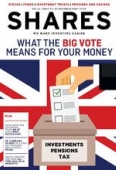Archived article
Please note that tax, investment, pension and ISA rules can change and the information and any views contained in this article may now be inaccurate.
Skin in the game doesn’t mean better returns

Picking a fund or an investment trust where the manager also has their own money invested is sometimes seen as a sure-fire way to guarantee better returns.
But an increasing number of investment commentators believe this is a misconception, and research from analysts at Investec shows this could well be the case when it comes to investment trusts.
In a report looking at 303 investment trusts, Investec analysts Alan Brierley and Ben Newell concluded that while having skin in the game sends a ‘clear and powerful message’ to both existing and potential investors, it is ‘not a panacea for superior returns’.
The analysts highlighted two trusts in particular – Boussard & Gavaudan (BGHS) and JZ Capital (JZCP), whose management have a whopping £129m and £100m of their personal wealth invested respectively.
In these cases the performance of both trusts were significantly underwhelming, but the managers were still rewarded handsomely. Newell said the size of the investments had given the managers ‘too much power and [led to] weak corporate governance’.
In the case of Boussard & Gavaudan, over the past three years the annualised total return of the trust based on its net asset value (NAV) is only 2.5% a year, while over five years the compound annual growth rate of the trust’s NAV is just 5.3%.
Meanwhile, the trust has an annual base management fee of 1.5% of NAV. Over the past five years, its management has raked in €101.7m in fees, comprising €49.1m in management fees and €52.6m in performance fees.
In the case of JZ Capital, over five years it has delivered NAV and shareholder total returns of 44% and 25% respectively, significantly behind the peer group average of 86% and 102% respectively.
The trust’s average discount to NAV over the past five years has been 37%, more than double the peer group average of 17%.
Investec’s analysts note that despite this ‘disappointing experience for investors’, the managers received base and performance fees totalling $128m in the five years to February 2019.
In addition, the report named and shamed 30 trusts whose boards’ aggregate investment was worth less than the total fees they received over six months.
Despite some of the issues flagged with ‘excessive’ skin in the game, the analysts said a significant personal investment is still a good way to align interests between managers and shareholders.
They highlighted Simon Barnard, manager of Smithson Investment Trust (SSON), who told them 90% of his investible wealth is in the trust with the rest invested in Fundsmith Equity (B41YBW7).
DISCLAIMER: Editor Daniel Coatsworth owns shares in Smithson
Important information:
These articles are provided by Shares magazine which is published by AJ Bell Media, a part of AJ Bell. Shares is not written by AJ Bell.
Shares is provided for your general information and use and is not a personal recommendation to invest. It is not intended to be relied upon by you in making or not making any investment decisions. The investments referred to in these articles will not be suitable for all investors. If in doubt please seek appropriate independent financial advice.
Investors acting on the information in these articles do so at their own risk and AJ Bell Media and its staff do not accept liability for losses suffered by investors as a result of their investment decisions.

 magazine
magazine









